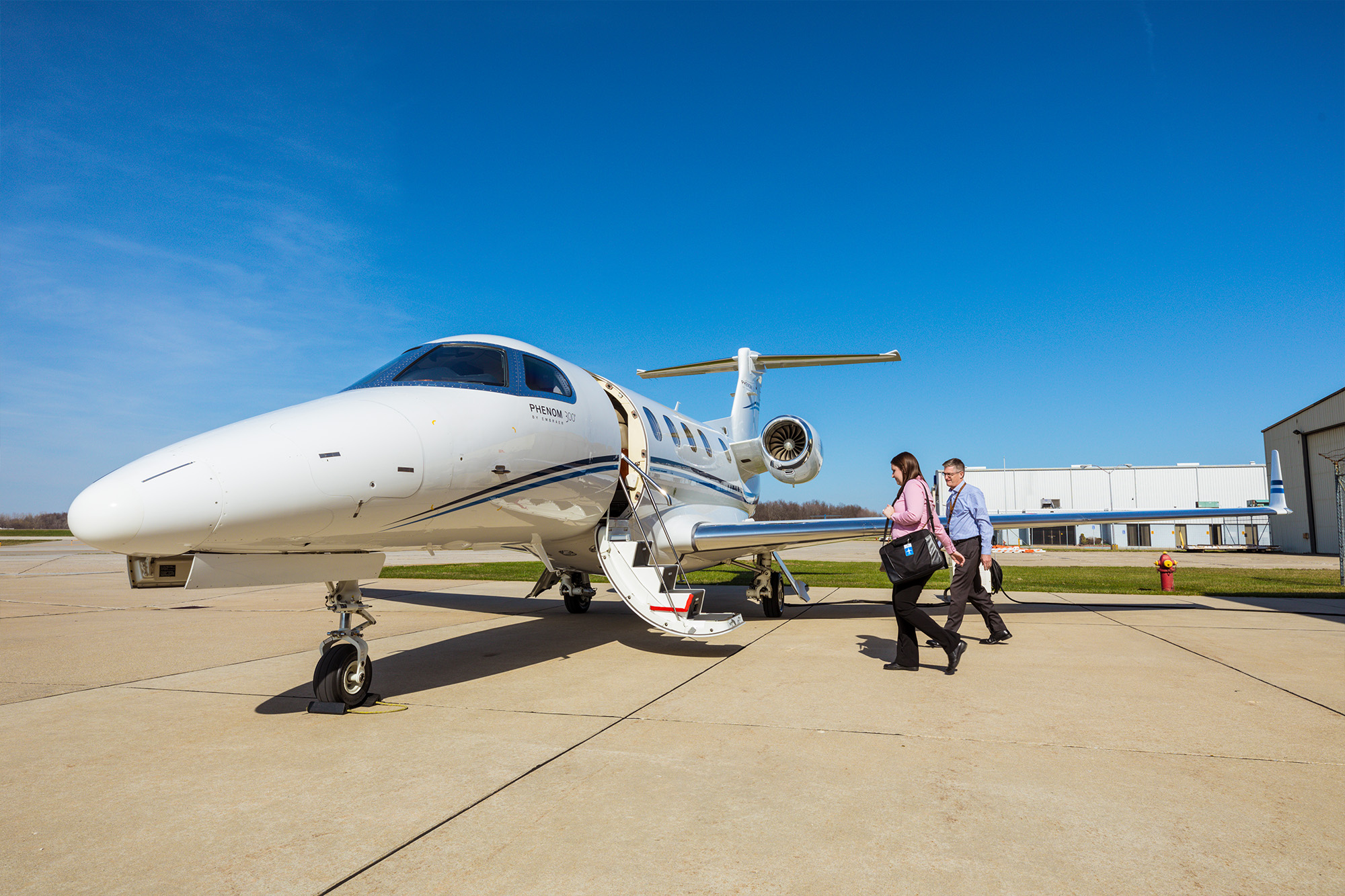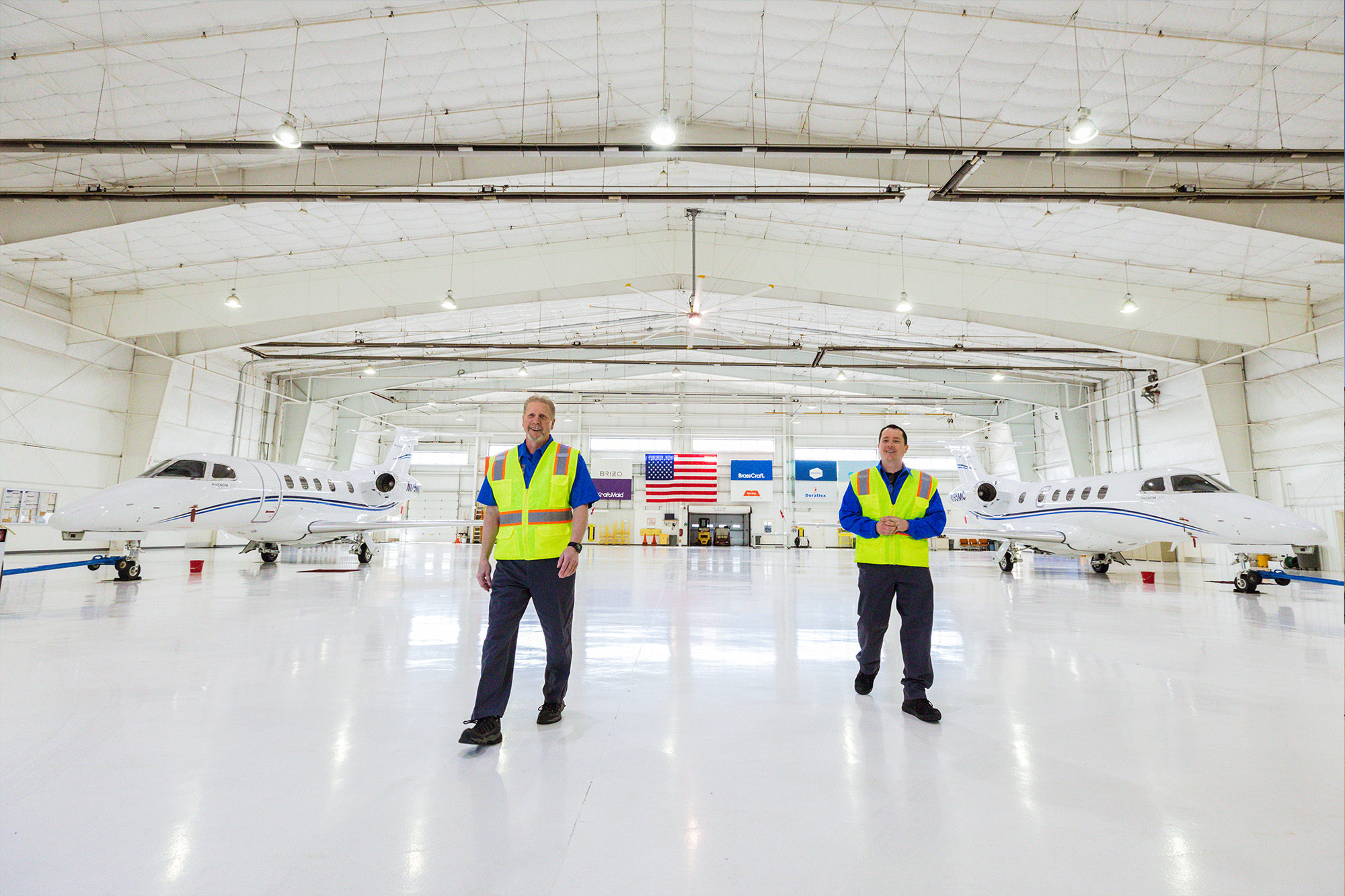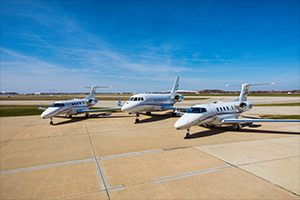
Adapting to changes in business and technology, Masco’s flight department is stronger than ever.
Oct. 14, 2018
In the last decade, Detroit-based Masco has gone through nearly every change a flight department could and emerged stronger than ever. The aviation operation has gone through economic booms and busts, updated its fleet and footprint to match the company’s evolving business strategy, stayed ahead of business aviation’s workforce shortage and kept up with the industry’s newest technology.
“In my first year as director, we went through base relocations, staffing changes and a leadership transition,” said Jay Orwin, who has served as director of aviation since 2013. “We learned a lot.”
Masco is a global leader in the design, manufacture and distribution of branded home improvement and building products with a portfolio of brands including Behr® paint, Delta® faucets and KraftMaid® and Merillat® cabinets, to name a few. The company has had a flight department since 1966, starting with a single Beechcraft Baron. In the 1990s, it grew rapidly. Then, in 2008, it was hit hard by the economic downturn and the collapse of the housing market.
“As we’ve grown and changed over the years, the flight department has remained a very tight-knit group,” said John Lindow, Masco’s VP-controller. “The pilots, maintenance team and administrative staff, they all wear a lot of different hats. Together, we try to drive innovation in every aspect of our operation.”

BRINGING THE BIRDS HOME
Masco has historically grown through acquisitions. By 2008, several acquisitions had added aircraft to Masco’s fleet at airports in Florida, Tennessee and Washington. The acquisition of a cabinetry company added another airplane in Adrian, MI, only 45 minutes from Detroit.
After the 2008 housing recession, Masco consolidated its fleet at a central base. By 2017, the flight department had shifted from several King Airs and jets to two Embraer Phenom 300s and a Dassault Falcon 2000LXS.
“Today, all of our airplanes are based here at Detroit Metropolitan Airport,” said Orwin. “Years ago, we did a lot of flying around the Midwest, and the King Airs were perfect for that. The business changed, now we have companies on the West Coast, East Coast, even in Europe, and we have the right airplanes for that.”
Orwin, Lindow and the maintenance team led by Randy Gardner put years of work into the fleet planning and consolidation. They scored several models against dozens of criteria, based on trip data, maintenance schedules and performance.
The consolidation of Masco’s fleet reflected the consolidation of the company’s business units.
“We have roughly 20 different business units, some of them located in very small towns, maybe two or three hours from a large commercial airport,” said Lindow. “With the aircraft we have, we’re able to fly in and get right to work. We’re very focused on getting the maximum usage out of the airplanes.”
Teams often travel together, and schedule coordinator Connie Boyd works to fill open seats, so passenger load factors are high. The aircraft can make four or five stops in a single day, and each airplane flies about 350 hours per year.

INSOURCING MAINTENANCE
Flight department staffing has also evolved. Today, six of the seven pilots are type-rated on both aircraft. The seventh, hired recently, is working on her Falcon type rating.
Masco has a history of performing much of its maintenance in-house, but even that has changed with the times. When the company flew King Airs, they kept a full metal shop in the Detroit hangar to facilitate skin repairs. Most of the components on the aircraft under-went frequent, regular inspections, so Masco’s technicians gained experience performing those tasks.
“We did those inspections over and over, and we could do them in our sleep,” said Gardner. “Now, our airplanes are on an MSG-3 [Maintenance Steering Group 3] program, and the purpose is to do inspections just in time, so the maintenance interval may be longer, and we may not be as familiar with every step.” On top of that, “maintenance is not as intuitive as it used to be.”
Masco does all Phenom maintenance and most of the work on the Falcon in-house. But because of newer technologies and the rhythms of modern maintenance programs, training and currency have become more complex.
Each of Gardner’s technicians functions as a “crew chief” for each airplane, keeping up with ADs, warranty pro-grams and service bulletins.
Gardner’s team also includes a full-time materials coordinator, Shalimar Diegel. She manages the department’s large parts inventory – ordering, receiving and stocking parts. The system is now completely computerized, helping increase dispatch reliability.
“Masco has changed a great deal, but they [company managers] still under-stand what we bring to the table,” said Gardner. “We’ve had to adapt, and it’s an ongoing process figuring out what we do in-house and what we take to an MRO.”
When deciding what to outsource or what to do in-house, Gardner and Orwin consider the technicians’ experience with the task, how frequently it’s likely to occur and the cost of the tooling. For example, the Phenoms’ annual engine inspection was frequent enough to invest the time in training to do the inspection in-house. On the other hand, although changing actuators is a simple process, they need to be electronically calibrated with expensive equipment, so Masco has a vendor do the calibrations.
RECRUITING AND RETENTION
While the aviation leaders have worked to tailor their operation to Masco’s business, they’re also committed to supporting the company’s strategic priorities.
“One of my jobs is making sure what we’re doing at the flight department is aligned with what the home office is doing, so we’re all pulling in the same direction,” said Orwin. “Masco, through the Masco Operating System, is focused on process improvement, and in aviation, we’re of course very process-oriented, so that’s been a natural fit for us.”
Recently, the aviation operation has accelerated its transition to electronic records, eliminating hours of data entry work. Another area were Masco is trying to stay ahead is in workforce development. Orwin has served as vice chair of the Michigan Business Aviation Association, helping to grow its Talent Pipeline program, which includes scholarships, internships and mentoring to bring students into the industry.
“We have great relationships with all the universities in Michigan, and we’ve had great success recruiting interns from those schools,” said Orwin. “Diversity also is important to us, and we’re committed to hiring more personnel from underrepresented backgrounds.”
OPERATION GOOD CHEER
For many years, Masco has been com-mitted to flying goodwill and humanitarian missions whenever it can. The flight department conducts flights for the Corporate Angel Network and Veterans Airlift Command, flying cancer patients and wounded service members to medical treatment. The company also has been a longtime participant in Michigan’s annual Operation Good Cheer.
Several business aircraft operators in Michigan volunteer personnel and planes for Operation Good Cheer, bringing toys to children who other-wise wouldn’t be able to celebrate the holidays.
“During the holiday season, we just want to give back,” said Masco’s Director of Aviation Jay Orwin. “It’s a team-building activity for our flight department, but it’s all about transport-ing gifts to foster kids in Michigan, and we’re happy to do anything we can.”
Volunteers delivered gifts to more than 6,000 children and adults with disabilities in 2017, the 46th year of Operation Good Cheer. About two dozen companies participated, as did 265 volunteer pilots, who delivered more than 20,000 gifts.

SNAPSHOT
Aircraft:
Two Embraer Phenom 300s and one Dassault Falcon 2000LXS
Base:
Detroit Metropolitan Airport (DTW)
Personnel:
Seven pilots (including a director of aviation who flies), four maintenance technicians and two administrative personnel


 International Business Aviation Council Ltd.
International Business Aviation Council Ltd.